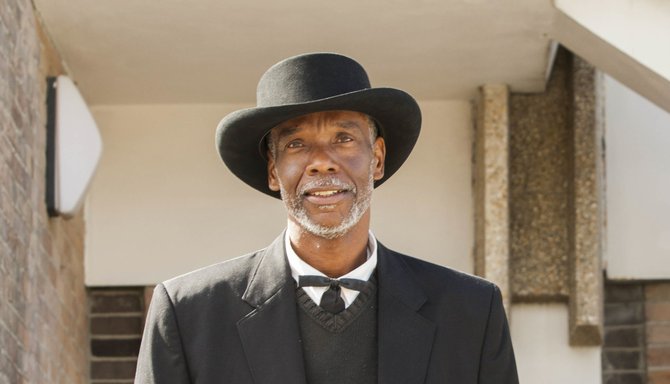Robert Thompson is back on the ballot this year in the Ward 4 Jackson City Council race. This time, he’ll have a “D” beside his name—and a more “pro-choice” attitude. Photo by Jacob Fuller.
Robert Thompson
Born: Louise, Miss.
Age: 56
Political Experience: Ran for Ward 4 council seat in 2005; lost to Frank Bluntson.
Education: Bachelor's in criminal justice, concentration in juvenile justice from Jackson State University, 1982; Humphrey County High School, 1974
Family: Wife, Evelyn, nine children, including five still living at home
Robert Thompson is no stranger to comebacks. This May, he's hoping to rally from a 2005 defeat by Frank Bluntson to win the election for Jackson's Ward 4 City Council seat.
Born in the rural Delta just northwest of Yazoo City, Thompson left his home state soon after high school. "Just like everybody else, when I graduated in 1974, I wanted to get as far away from Mississippi as possible," Thompson said in an interview. "So I went to California and spent four years in the Army as a military policeman from 1974 to 78. Then I decided there was no place like home."
Now a hospice chaplain, Thompson has suffered setbacks. After working for 10 years as a counselor for the U.S. Department of Veterans Affairs, Thompson suffered from heart failure in 1992. He didn't let it beat him, though. He now runs to stay fit and even competes in marathons.
Thompson's political views have changed over the past eight years. In 2005, Thompson ran as a Republican, but is running as a Democrat this time around. He said abortion played a large role in his party affiliation last time around, but that the advice of a pastoral mentor, Ron Lovelace, changed his view on the hotly debated subject.
"One time, he said, 'Now Robert, do you say that God said you're going to choose this day who you're going to serve? If that's the case, isn't God pro-choice?'" Thompson said. Now he calls himself a Yellow Dog Democrat. "So I've changed."
Thompson visited the JFP offices Feb. 28 in his signature wide-brimmed black hat to talk about some his plans for city council.
If elected, what is your top priority?
Number one: Citizens definitely need to have a voice.
How specifically would you make that happen?
We used to have, and I don't see them anymore, those community meetings (in Ward 4). They don't exist anymore.* I don't know what happened, but they used to have those community meetings.
I think we should have a town-hall meeting, a round-table meting. I remember being a Boy Scout, and we'd have round-table meetings. Somebody from each community should be able to come in and let (the city council) know what's going on in the community.
I was just looking at Frank Melton's photo up there (on the shelf). One thing you need is city councilmen who are going to support the mayor, whoever the mayor may be.
One of the things that I truly believe is if you increase patrolmen in the neighborhoods, crime will go down. I have a problem when I go running in the morning, 26 miles, and can only count three policemen, out of 26 miles. Something is wrong. We need more policemen out there.
You run 26 miles every day?
No, I run 15 (miles) every other day. I do marathons. No, I compete in marathons.
Those potholes? We have a problem. Let's start downtown (fixing the potholes) and get downtown taken care of and trickle out into the community. Coming downtown is terrible. A lot of times I run early in the morning. I've got to be able to see. When I get downtown, I've got to look down to make sure I can plant my feet. It's terrible; it is terrible.
(Recently) the city council, for some reason, said they couldn't support the mayor when he wanted to do something with repaving the streets. Who cares if election time is coming up? If we can get it done during election time, let's get it done.
The city is facing hundreds of millions of dollars worth of water, sewer and street repairs. What would be your top infrastructure priority, and how would you look to fund it?
Number one: (We get) brown water. Something needs to be done.
I'm thinking, I have five children in school now. I've been PTA president several times. During the (Earl) Watkins administration, the community supported an increase in taxes to support the school system.
I think if the mayor, along with the city councilmen, lets the city know: (what) money is for (what project), we will say yes. We want to be able to see something. I think we'll say yes.
So what should be the top priority as far as spending that money?
The sewer system in my neighborhood. I live in west Jackson; there's something wrong. Every time it rains, the streets are flooded. Something is wrong when every three months, I need to call the fire department or something to come out and turn on the fire hydrant so the water can clear out.
Like I said earlier, if we truly let the citizens know where this money is being spent, I think we'll say yes. From what I've read, I believe they are saying we need to replace our water system.
A large portion of it, yes.
In my area, yes, that would be a top priority. Something is wrong when you turn the faucet on, and you look at this water and, you're scared to drink it.
The mayor is wanting to implement a local option, 1-cent sales tax that the voters would have to approve. Would you support that sales tax to fund infrastructure improvements?
The answer is yes. As a citizen, if you tell me we're going to have a 1-cent sales tax for X-amount of dollars over X-amount of time--earmark it for whatever project it's going to be and when that project is completed you'll cut it off--I think the citizens will go with that.
We want to see something, to know that there will be a beginning and an end. I'll support it, and I think the citizens will support it.
You mentioned crime and police. Jackson has, if not a crime problem, a crime perception problem. Aside from more police, what can we do to change that?
Get the community involved in a community-watch program. We need to be able to let the citizens know (that) we don't want your name, just call. We've got to be proactive.
In my neighborhood, we have about five homeowners. I live in a transient-type neighborhood by Lake Elementary. We'll call one another: "Do you hear somebody shooting?" "Yeah, it sounds like it's over on that road." And we'll call someone up on that road.
I think that's what we need: to emphasize getting involved. I think someone said a long time ago, "If you don't say nothing, nothing is going to be done." Neighborhood watch programs--they used to work.
Jackson Public Schools almost faced losing its accreditation last summer. What can the city do to help turn that around and make sure we're providing the best education for our kids?
One thing I like that is going on is that schools should be a safe haven for kids. I recently read that certified policemen are in the Jackson Public School system. I think that's a great thing.
First--and I know this is a legislative problem here--the mayor, along with the citizens, need to get on the horn and let the (state) Legislature know education needs to be fully funded. Something is wrong when you can go to Memphis and receive, as a teacher, thousands more (in pay) than in Mississippi. We're losing our teachers to these border states.
Comment and read more of this interview at www.jfp.ms. Email Jacob D. Fuller at [email protected].
*Editor's Note: Mayor Harvey Johnson Jr. and Jackson City Council members hold community meetings in each ward on a monthly basis.




Comments
Use the comment form below to begin a discussion about this content.
comments powered by Disqus